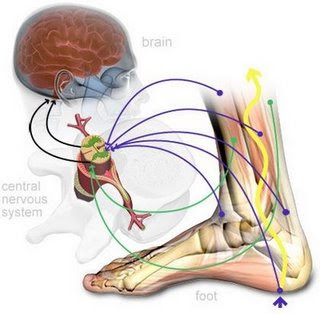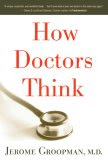It was a late fall Monday, during my third year of medical school. I had just finished a horrifically boring month of Geriatric Psychiatry at the VA hospital, and now was doing a month of Adult Psychiatry at the local psychiatric hospital. It was a locked ward, and every day we had to be buzzed in to the unit, and be buzzed out at the end of the day.
There were three medical students working the ward. We each took turns taking new patients when they were admitted and working them up. It was my turn to work up a new patient that had been brought in Sunday night.
The senior resident handed me the patient’s folder. It was a thin folder, suggesting that this was her first stay at the hospital – generally a good sign. The resident quickly dashed that hope.
“Mrs. D was brought to the ER last night for severe depression. There was no suicide attempt; her family was worried because she was staying in bed and not willing to move for the past week. Since being brought to the ward last night, she hasn’t moved at all; she’s just lay in bed staring at the ceiling.” She smiled a crooked smile at me. “Good luck.”
I looked through her chart and ER notes. There was nothing particularly alarming or interesting. She had been on outpatient treatment for depression on and off for about five years. No suicide attempts. No significant medical or family history. She was divorced with two teen-aged children.
I walked to her room, the last door on the left, opened it up and looked in. The room was dark, and a large woman was lying unmoving on the bed, staring at the ceiling. Her breathing was slow and steady and she did not seem to be in any kind of distress. I knocked and entered the room.
“Hello, ma’am. I’m the medical student, Scott. How are you doing today?”
There was no response. Not even a twitch of muscle or a flicker of eyelids.
I pulled a chair next to the head of the bed and sat down. I tried again, “Are you in any discomfort? Is there anything I can do?”
There was no change. She continued lying in bed, staring at the ceiling.
I pulled out the history form, and asked the first question. “How long have you been feeling depressed?”
No answer. No movement. It was like trying to talk to a brick wall. It was time to try a different tack.
“Tell me about your children. How old are they?”
This time there was a brief twitch of the eyes, but no other movement.
“Are you and your children getting ready for Thanksgiving?”
There was another eye twitch, but nothing else. Clearly, she could hear and probably respond, but was choosing not to.
“You were brought to the ER last night,” I said, getting no response. “So you missed Star Trek, (Star Trek is an American science fiction entertainment series and media franchise) then.” This was Star Trek the Next Generation’s last season, and it was shown on Sunday nights in St. Louis.
Her eyes opened, and she turned her head my way. “Why? Did I miss anything important?” she asked. I laughed, and we spent the next hour talking about Star Trek.
Once up and out of bed, she recovered quickly and was home by the end of the week. We established a good rapport, and had many long talks. I was glad to see her get to go home, but also sad, because she was one of the few bright spots in an otherwise dreary rotation.
There was an important lesson to be learned: Where standard dialogue had failed, where even family concerns were not enough, Star Trek had triumphed.
There were three medical students working the ward. We each took turns taking new patients when they were admitted and working them up. It was my turn to work up a new patient that had been brought in Sunday night.
The senior resident handed me the patient’s folder. It was a thin folder, suggesting that this was her first stay at the hospital – generally a good sign. The resident quickly dashed that hope.
“Mrs. D was brought to the ER last night for severe depression. There was no suicide attempt; her family was worried because she was staying in bed and not willing to move for the past week. Since being brought to the ward last night, she hasn’t moved at all; she’s just lay in bed staring at the ceiling.” She smiled a crooked smile at me. “Good luck.”
I looked through her chart and ER notes. There was nothing particularly alarming or interesting. She had been on outpatient treatment for depression on and off for about five years. No suicide attempts. No significant medical or family history. She was divorced with two teen-aged children.
I walked to her room, the last door on the left, opened it up and looked in. The room was dark, and a large woman was lying unmoving on the bed, staring at the ceiling. Her breathing was slow and steady and she did not seem to be in any kind of distress. I knocked and entered the room.
“Hello, ma’am. I’m the medical student, Scott. How are you doing today?”
There was no response. Not even a twitch of muscle or a flicker of eyelids.
I pulled a chair next to the head of the bed and sat down. I tried again, “Are you in any discomfort? Is there anything I can do?”
There was no change. She continued lying in bed, staring at the ceiling.
I pulled out the history form, and asked the first question. “How long have you been feeling depressed?”
No answer. No movement. It was like trying to talk to a brick wall. It was time to try a different tack.
“Tell me about your children. How old are they?”
This time there was a brief twitch of the eyes, but no other movement.
“Are you and your children getting ready for Thanksgiving?”
There was another eye twitch, but nothing else. Clearly, she could hear and probably respond, but was choosing not to.
“You were brought to the ER last night,” I said, getting no response. “So you missed Star Trek, (Star Trek is an American science fiction entertainment series and media franchise) then.” This was Star Trek the Next Generation’s last season, and it was shown on Sunday nights in St. Louis.
Her eyes opened, and she turned her head my way. “Why? Did I miss anything important?” she asked. I laughed, and we spent the next hour talking about Star Trek.
Once up and out of bed, she recovered quickly and was home by the end of the week. We established a good rapport, and had many long talks. I was glad to see her get to go home, but also sad, because she was one of the few bright spots in an otherwise dreary rotation.
There was an important lesson to be learned: Where standard dialogue had failed, where even family concerns were not enough, Star Trek had triumphed.

























